Whether you’re a large or small business owner looking to sell online, one crucial decision early on is picking out the perfect digital home for selling your products. However, the big debate is between Shopify vs Etsy, two of the biggest eCommerce solutions.
But how can you tell whether Shopify or Etsy will work well for your business? Although both Shopify and Etsy are online sales channels, they primarily represent two different ways you can reach potential customers.
Even then, you should choose a platform that best aligns with your business goals and resources. In some instances, you could even sell on both platforms.
In this article, I’ll be comparing Etsy vs Shopify. This way, you’ll be able to choose the best platform for your business needs.
Before, I dive into the difference, its importance that I briefly discuss the two platforms. So let’s get right to it.
Shopify and Etsy: A Brief Introduction
When choosing your e-commerce provider it’s important that you carefully consider the setup time required. This should also look at the time that the most user friendly platforms require to set up.
That means consider where your business is right now plus the expected sales six months or even a year down the line. Once you have this information then will you be able to determine your best choice between Etsy and Shopify matchup.
Shopify
This eCommerce website builder was founded in 2004. The Shopify platform makes it easy for you to set up your online storefront. What’s more, this platform allows you to choose the design you want. Shopify comes with tons of tools that help you define your brand, display your products, and even market yourself.
In addition, Shopify provides you with hundreds of integrations that help extend your store’s functionality and supports the integration of different software. This is crucial if you already have several programs that you use to operate your online store.
The good thing with Shopify is that it works for both larger as well as smaller businesses. Many sellers from around the world use this platform to sell hundreds of products to millions of people. So far, this platform has processed transactions worth more than $82 billion.
Etsy
This is an online marketplace that features many online vendors. All retailers on Etsy have one thing in common…their products are of a crafty and artsy nature. This makes the Etsy market intensely competitive.
Etsy was established as an online marketplace for selling handmade crafts. While it has over time transitioned into a multifaceted e-commerce platform, this still remains its primary mission.
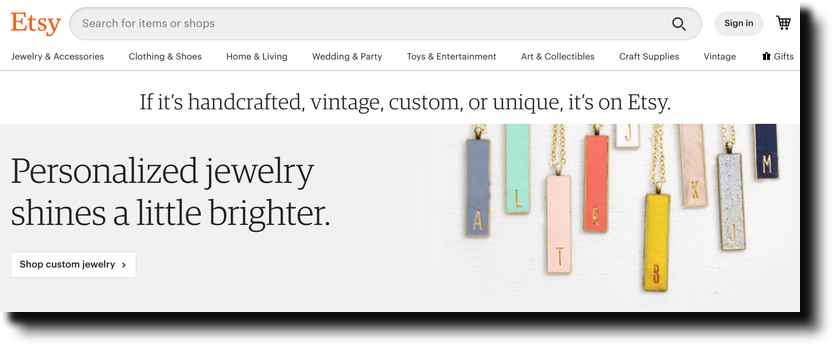
It has in the recent years also included the ability for retailers to collaborate with third-party fulfilment providers and manufacturers. Even then, Etsy has maintained its three primary product categories: crafting supplies, handcrafted and vintage items of around 20 years old.
Even after adding these functionalities since it was established in 2005, Etsy is mainly for smaller operations.
This marketplace invites independent sellers of different sizes to sell on the platform. Plus, it’s mostly used as an entry-level shopfront that works well for new traders with unique items and limited stock.
Pattern by Etsy
Besides being able to make and publish listings on Etsy, this online marketplace has an ecommerce platform called Pattern by Etsy. On this platform, you can set up your website and directly sell products from it. Pattern by Etsy is accessible for free within the initial 30 days. Thereafter it’s subject to a monthly fee of $15.
Even then, it’s not as customizable or sophisticated as Shopify since it’s an add-on for people already selling on Etsy. Still, it has fewer restrictions compared to those found on the Etsy Marketplace.
Comparing Shopify vs. Etsy
So how is Shopify different from Etsy?
For starters, the Shopify eCommerce platform is designed to help people build and expand their online stores. Shopify also has numerous powerful eCommerce Apps and tools you can use to do this.
It allows you to build your e-commerce website, upload images of your products as well as track customer orders. This makes it easy for you to create your online store.
Since Etsy is a marketplace that lets you create an account for you to sell your products alongside other Etsy sellers. What’s unique about Etsy is that it only sells vintage, handmade, or craft goods.
In this guide, I’ll tell you what you need to know about Shopify vs. Etsy by considering their capabilities and offerings. But the question still remains; is Shopify better than Etsy?
Shopify vs. Etsy: Features
On a basic level, both Shopify and Etsy have similar capabilities: inventory management and online sales. However, beyond that, apparent differences are noticeable between both of them as concerns advanced functionality plus the potential to scale up as the sales increase.
Shopify offers…
Shopify can work well for you if you’ve set big plans for your online business. Its features provide you with the means to expand fast and boost your conversion funnel.
Besides your e-commerce site, this platform gives you access to other sales channels. Also, if you already offer face-to-face sales, Shopify POS can help you bundle all the credit card transactions under one system.
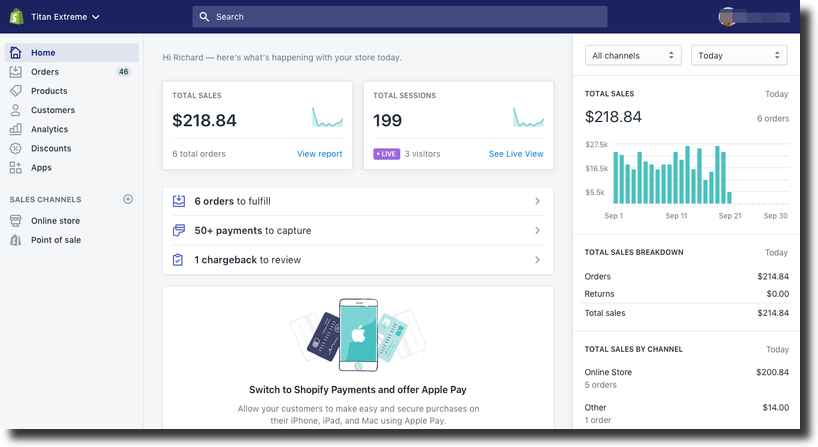
What’s more, Shopify has been designed to easily integrate with both Instagram and Facebook which allows you to sell your products on these platforms too. Again, if you are selling on Amazon, Shopify allows you to manage your products from a single interface.
Also, Shopify includes reporting features that offer you the information needed in making smart business decisions.
This platform also features a huge customer relationship management (CRM) as well as marketing tools such as built-in SEO tips, blogging, integration with your social media profiles, and the capability to offer customers gift cards and discounts. Since Shopify is a cloud-based platform, any changes and updates you make on your dashboard automatically sync with the App or vice versa.
Another tool that many business owners find to be valuable is Shopify’s App Store. This app lets you search and download multiple apps to integrate in your store which helps optimize your processes. These processes can include inventory management, upselling, product reviews, SEO tactics, and much more.
Other than the basic information like sales for specific time periods, Shopify allows you to breakdown sales from other eCommerce KPI (key performance indicators) like individual products, average revenue for each order, sales channels, discounts, currency, and returns.
These features can help you come up with actionable business intelligence for determining customer lifetime value plus contribute to the process of product development.
Would you rather get started right away? You can use Shopify Exchange to purchase an existing online store. If this option is what you’re looking for, you can use the Shopify marketplace to filter stores for sale by monthly revenue, price, business type, age, and industry.
Etsy offers…
Etsy is mainly focused towards small businesses and sole proprietorships that sell on a small scale. Although it has features that are less robust, they’re easy to use. Plus, rather than have a standalone website to set up your online store, you’ll get a storefront on Etsy’s website.
Etsy is more a craft fair that lets vendors setup their “tables” under one roof instead of having your store. One major plus is how much traffic you could potentially receive thanks to Etsy’s homepage that has a search bar that is prominently displayed.
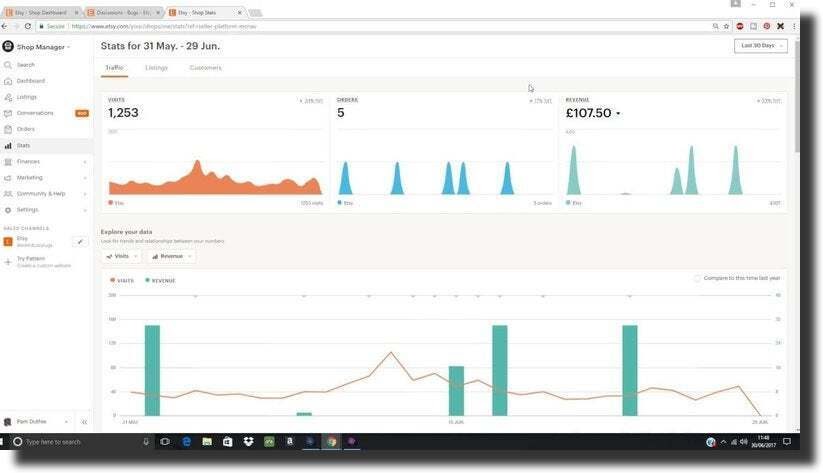
When it comes to getting website traffic, this platform is among the most highly ranked plus time and again it’s among the top 150 the world over. This will help reduce your cost per acquisition for every new customer.
Like Shopify, Etsy allows you to manage your product listings and orders, interact with your buyers, and even buy and print postage through the Etsy App or an online dashboard.
However, unlike Shopify that supports the integration with different third-party payment processors (at an extra transaction fee), its users are only able to accept payments via Etsy Payments.
The Etsy Payments is an in-house payment processor which accepts all the major kinds of payments, which include debit and credit cards, Google Pay, PayPal, Apple Pay, and ACH payments.
What’s more this platform offers you an add-on option known as Etsy Pattern which lets you set up your e-commerce website. This does not replace your existing Etsy storefront but rather it supplements it. Also, you can drive sales via Facebook, even though you’ll be required to have one third-party app for you to do that.
As concerns analytics and sales reports, the amount of data available can easily overwhelm you. Etsy follows the basics you need to know: product listing, traffic, customers and number of visits plus revenue.
Shopify vs. Etsy: Ease of use
It is important that you consider the ease of use because you’d rather spend your days growing your customer base and making sales than learning to navigate your new e-commerce system.
Shopify offers…
To start with Shopify uses a simple dashboard that comes with useful information: a menu on the left column separates the different areas you need to access and that include products, orders, and analytics. It also has additional panes that display customer sessions, total sales, and sales from each channel.
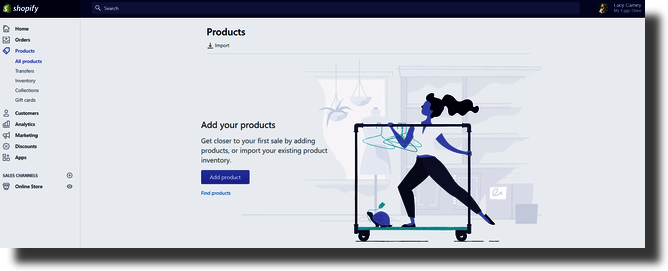
It also has advanced features like inventory management, integration of e-commerce email marketing and additional granular reporting. While all tools are valuable tools, it ultimately helps create a steeper learning curve.
Etsy offers…
When considering Etsy, the account dashboard provides you information that’s similar to Shopify: product listings, access to orders, and customer statistics. What’s more, since it does not have many advanced features, everything you see is what you get.
However, you can use opt to include third-party integrations which help you further modify your store’s e-commerce abilities.
Here Etsy offers you competitive pricing while Shopify pricing increases quickly — its monthly plan of $79 is what you might have to choose if your online sales are more than minimal. Again Etsy offers you more competitive prices for you to use its features.
Since Etsy uses a stripped-down design this is what contributes to the platform’s ease of use. Since there’s less to learn, you set up your store more quickly.
Shopify vs Etsy: Ideal Sellers
Ideal Etsy Seller: This marketplace is perfect for you if you make or sell vintage, homemade, and craft supplies. If you’re new to online retailing but you want to try selling your products as a beginner.
It also works for you if you’re a one-man show and don’t have many resources. Etsy is for you if you want to set up fast and want to have a following to sell to. Is it worth it to sell on Etsy? If the ideal seller’s quick description is what you want, then Etsy might be right for you.
Ideal Shopify Seller: Shopify is for you if you’ve been selling your merchandise for a while and your brand has started to get more local attraction. You might be looking to expand your customer base and product line.
As such, having full control over how your brand looks and feels is important. Plus having the resources to make this happen is key as well. If this is what you’re seeking, then building a webstore with Shopify may be your next step as you look to expand your business.
Shopify vs. Etsy: Rules & Limitations
As concerns using Shopify, the platform allows you to sell whatever you want, depending on the platform’s terms of service and your local laws (that is, no illegal objects, substances, or content).
This channel lets you sell your own products and even list manufactured products to compliment your products. Since you own the store, you can run it depending on your set business goals.
As for Etsy, your activity is subject to the set marketplace rules that currently limit products only to artisanal, handmade, or vintage goods. So, if you’re considering cross-selling or up-selling complementary manufactured products then it won’t work for you.
Shopify vs. Etsy: Traffic Sources
When using Shopify, you’ll be responsible for driving clients to your site. Also, you’ll need to come up with an efficient eCommerce marketing plan and implement it.
Shopify comes with a huge range of apps and features that simplify the execution process than other platforms (it supports email marketing apps, has a SEO-friendly structure, etc). However, Shopify will not actively attract visitors and direct them to your website.
As for Etsy, it advertises and draws in customers to this marketplace which includes any visitors you directly bring to your Etsy shop. Since most customers start searching on Etsy for a shop offering their sought for product. It then means they are pre-sold on making a purchase from an Etsy shop. So all you should provide is what they want.
Shopify vs. Etsy: Integration with other software
Since all e-commerce platforms cannot do everything you require, you’ll soon find that you need to use multiple third-party apps, integrations or plug-ins to offer the exact functions your online store needs.
Caution: Although some apps have a free period or are free, you’ll need to buy most of them. Also some might attract monthly subscription fees.
Shopify offers…
Since Shopify operates to a large scale with its upper-tier plans, it offers you a corresponding huge app store that gives you access to more than 4,000 of its own as well as third-party options.
To help you choose a design for the store, you have access to 1,793 apps that will help do that. Also, you have access to hundreds more you can use for your e-commerce marketing, productivity, finances, orders and fulfilment, reporting, and inventory turnover ratio.
Even before you sign up, you’ll be able to see all the apps available to you for your chosen Shopify plan. This ensures you can do what you want for your online store.
Etsy offers…
As mentioned above, Etsy’s main strengths lie in its strictly basic functionality which offers you a trouble-free learning curve. Again, that means you will need multiple add-on apps to help you customize it to suit your needs.
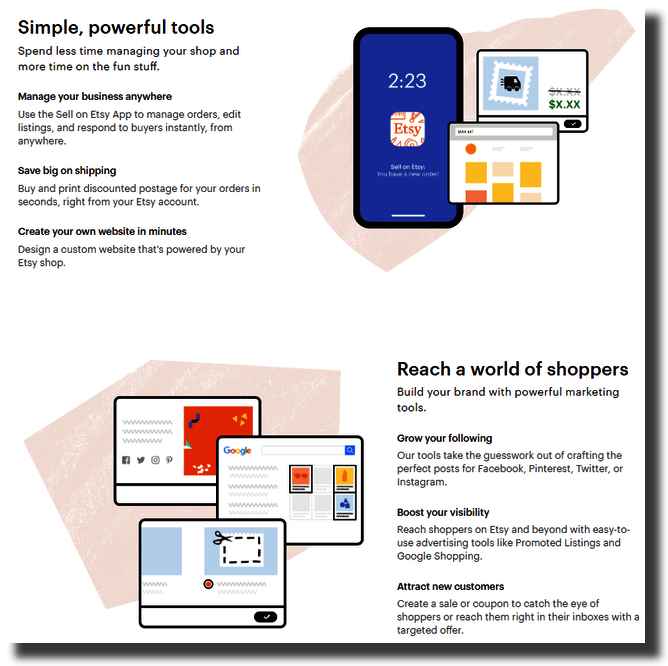
For instance, while Shopify has the Shopify POS that supports in-person sales, Etsy will have you using Square for the very function.
Also, before you can use the available integrations and apps, you’ll need to create an account then build your storefront.
However, to help you see what Etsy offers without signing up first, you have to search through many online articles that describe this marketplace’s most popular apps.
Shopify vs. Etsy: Pricing
Shopify Pricing
Since Shopify operates on the monthly subscription model, it means you’ll be paying a flat monthly fee for you to set up and run your store and credit card rates per sale made.
The good thing is you won’t be charged a per-listing fee which lets you sell a huge amount of products, without a time limit, and you don’t have to pay extra cash as the business grows.
Shopify provides three account tiers that increase both in capabilities and monthly fees:
- Basic Shopify: A $29 monthly fee and 2.9% plus $0.30 for all online credit card sales. In addition, there’s a 2.7% fee for in-person sales, or 2% fee for other payment processors.
- Shopify: A $79 monthly fee and 2.6% fee plus $0.30 for all credit card sales made online. An additional 2.5% fee for in-person sales or if you use other payment processors a 1% fee.
- Advanced Shopify: A $299 monthly fee, and 2.4% + $0.30 on any credit card sales made online. An additional 2.4% for all in-person sales or a 0.5% fee earned from other payment processors.
Each plan above comes with shipping discounts from UPS, DHL and USPS using Shopify Shipping. For Basic Shopify plan up to 64%, 72% on the Shopify plan, and Advanced Shopify offering 74% discount.
Also, note that any add-ons downloaded using Shopify App store cost you extra. Plus before you are required to get any of the plans, Shopify gives a 14-day free period after you’ve launched your store.
Etsy Pricing
The standard plan from Etsy is completely free to use, however, they also have a Plus plan at a $10 monthly fee. As you’d imagine, the price of the paid plan gives you access to additional tools. This includes shop customization, email marketing tools, and your custom address.
Regardless of the Etsy plan you go for, you’ll have to pay three additional fees:
- Listing fee: Each item you list on Etsy costs you $0.20. The listings only stay up for four months or upon when the item sells.
- Transaction fee: Each transaction on Etsy costs 5%.
- Payment processing fee: Payment processing fees on Etsy cost 3% plus $0.25.
From these prices, you’ll note that Etsy offers inexpensive listing prices, but the additional fees will outweigh those by Shopify.
Also depending on your product sales and volume you will overtime spend more to run your Etsy page. That’s compared to what you would when using the monthly subscription fees from a Shopify store.
Shopify vs Etsy: Branding
Shopify Branding
On Shopify, setting your design depends on you. Shopify provides a vast collection of premium and also free “themes” to choose from and with a click install on your site. You can do this if you want a custom design. These themes also generate HTML/CSS allowing you to get any design you want.
Since Shopify lets you use any design rather than the standard design, it then means there’s no “Shopify site”.
Etsy Branding
Etsy gives you a global shop design. While you can change your colors and to some extent sort your products, all customization on Etsy are within set parameters.
Although it offers some room to grow your brand with a layout, logo, etc – but all this is within Etsy’s parameters. Plus this depends on the Patterns of the products. In short, all customizations should happen within set boundaries.
As such as a customer browses on Etsy and then visits your shop, they’ll still be on Etsy and not on a separate website.
Note: This difference doesn’t count as a pro or con for the two channels. Even though there are many advantages from customizing your page on Etsy.
The customers here are familiar with its design so they don’t need to “learn” your site design. Etsy will then study how customers browse and buy so they can implement these changes throughout the channel thus getting you more sales.
However, you might get “stuck” growing someone else’s brand (that’s Etsy) instead of your own. Therefore, you won’t be getting the long-term advantage of independence.
Later, I’ll be looking at using Etsy alongside Shopify, but first let’s continue going through the things you should consider when starting out.
Shopify vs Etsy: URL Structure and Domain Name
If you decide to use Shopify, the storefront you’ll build requires a home on the new. Thus, you’ll need to register and have your own domain.
Also, this works well as you establish your brand. However, this attracts additional costs of paying for the right to your chosen domain and hosting. Shopify helps simplify this thanks to its structured process for signing up a website domain.
Top Tip: Choose a domain name that’s short and snappy as this helps make your online store easy to search for and more memorable.
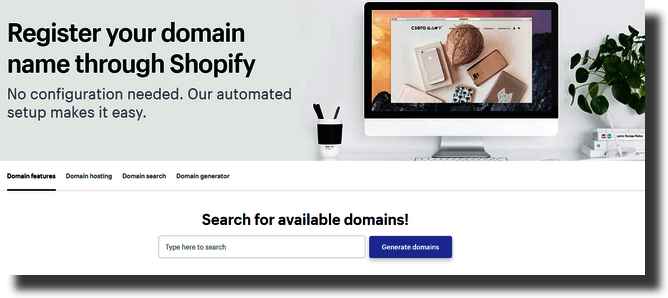
A domain name is a website address that people use to get to your website. To have the address requires that you pay a monthly or annual fee, and this means no one else can use it on the wide web. The domain name is unique for your website, which makes it a powerful component of your brand.
Domains that you pick and pay for are referred to as custom domains. This is important to mention since Shopify encourages vendors to use their custom domain. The reason for this being that a custom domain helps you create a professional, trustworthy, and recognizable brand name for your online store.
In addition, Shopify has an automated setup which makes it easy for you to obtain a fully personalized domain name for your store.
Etsy Domain Name
On the other hand Etsy works differently. Since you’ve listed your products on Etsy’s marketplace, it means you won’t get a domain name for your online store. Rather, your domain will be something like: www.etsy.com/shop/your-onlineshop-name-here.
The thing with Etsy is you won’t get a custom domain since you’re selling under Etsy’s umbrella. But, it allows for you to link your own domain, that is if you use Etsy’s Pattern builder. However, this might not be ideal for you if you’re looking to create your brand name. All the same this shouldn’t be an issue for individual sellers who want to maintain a simple and small store.
Shopify vs Etsy: Security
The good news is that both Shopify and Etsy use PCI compliant systems, and offer site-wide SSL certificates. This means online security for your store should be an issue with these platforms.
Whether you’re on Etsy Pattern, all your transactions will need to be processed on the Etsy platform, thus you’ll benefit from their tight security whenever you make any sale.
Shopify vs Etsy: Ecommerce Tools
Etsy eCommerce tools
Etsy uses basic but useful eCommerce features which makes managing your online store easy. To manage things on the go, consider using the ‘Sell on Etsy App’.
Also, you could use the Etsy account to purchase and even print discounted postage. In doing so, you can speed up the process plus save on your shipping costs. Etsy provides you with advertising and marketing tools to help grow your customer base, increase your visibility, and attract new followers.
You can share your listing across social platforms like Twitter and Instagram, create coupons, or apply third-party tools for instance Google Shopping to ensure more people find your store. Etsy ecommerce tools are simple yet effective in helping you run your store in a proactive and easy way.
Remember that Etsy supports the selling of vintage products, handmade goods, and craft supplies. Therefore, if you are offering something that’s outside of these, then Etsy might not be the best for you.
For more sales tools than those available on Etsy’s free plan, you could upgrade to Etsy Plus that gives you:
- Advertising credits.
- Customizable options like banner templates.
- Deals to have your own website address.
- Discounts for marketing materials like business cards.
- Email alerts you can send to your customers once you restock an item.
Since Etsy isn’t an eCommerce platform rather a marketplace, your inventory isn’t part of your store account. Therefore, you’ll need to monitor this yourself.
Overall, Etsy offers “simple, powerful tools”. While they aren’t the most remarkable e-commerce features, when doing small scale selling of crafts and homemade products, they work perfectly.
Shopify eCommerce Tools
If you’re looking for the best tools on the market, using Shopify can give you just that. Its sales features are thus far unmatched on the market. This makes Shopify perfect for any business that is looking to grow.
The best part with this platform is that it lets you sell unlimited products on all its plans. Plus it doesn’t have restrictions on products you can sell here either.
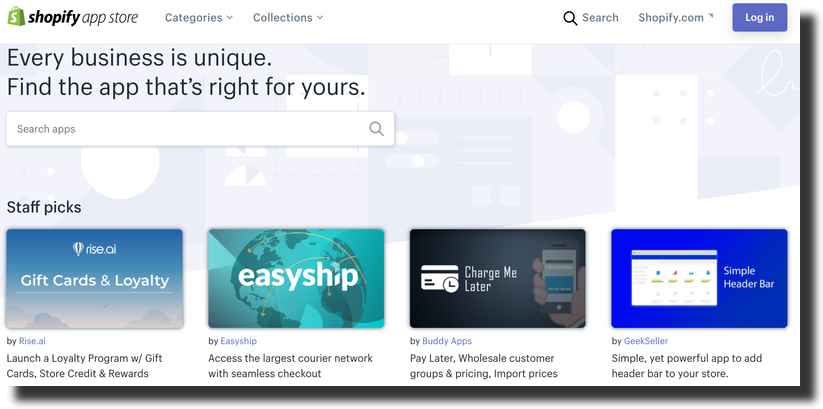
Shopify’s app store is impressive and will offer you access to hundreds of apps that support the expansion and customization of your online store.
Features you can get on all Shopify plans include:
- Discount codes;
- Multichannel selling on 10 different social channels;
- Free SSL certificate;
- Gift cards;
- Abandoned Cart Recovery;
- Fraud analysis;
- Calculated third-party shipping rates;
- Shopify Point of Sale (POS) app.
To help grow your customer base, multichannel selling plays a huge part plus it gives your customers that effortless buying experience. Having a free Secure Sockets Layer (SSL) certificate means that your online store is safe hence visitors can enter their payment details. Also this feature is key for all online stores.
The Abandoned Cart Recovery feature sends emails to customers who’ve abandoned products at checkout. It also encourages your customers to return.
Shopify’s best sales tool is its inventory system and it is extensive. It allows for uploading products in bulk or you can upload one image at a time. Also, it has in-built stock management tools, making it easy to monitor and analyze your online sales.
Shopify vs Etsy: Inventory and Payment Processing
When using Shopify, you get a complete inventory management system which syncs with orders and customers. Also, this platform has its payment processing service as well as a point-of-sale service which lets you sync your Shopify inventory with your offline sales.
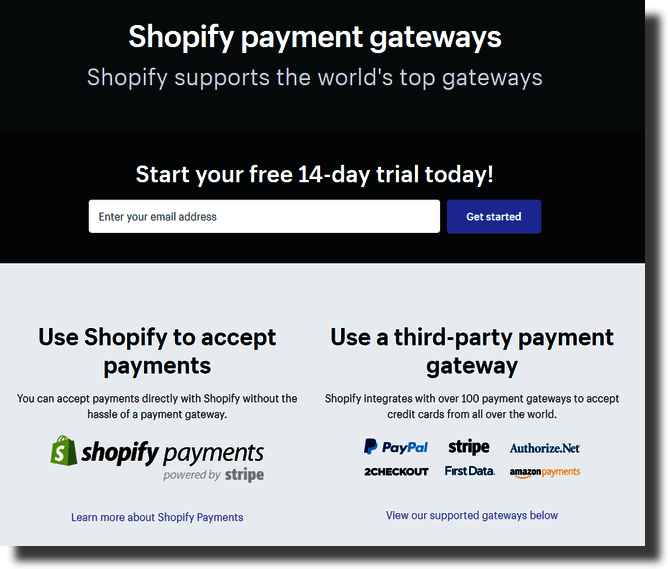
Again, Etsy is not a platform but rather a marketplace. Here you can list your products for sale using a pay per listing model but you’ll need to maintain your inventory records elsewhere.
Although you’ll come across 3rd party apps you can use to tie your Etsy sales to your inventory, to manage them you can only do that from the 3rd party app – so it’s not incorporated into Etsy.
Shopify vs. Etsy: Support
As you move into e-commerce, you’ll need lots of customer support and this is critical. Even for someone who is familiar with website development and design, and more so if you aren’t, you will certainly need help as you sift through all the many details of the setup.
Shopify support
Shopify comes with five ways to offer customer support:
- Discussion forums;
- 24/7 support team accessible by phone, email, and chat;
- User guides, tutorials and answers to FAQs ( frequently asked questions) accessible from Shopify Help Center;
- Shopify-approved professionals for marketing, e-commerce design, and development;
- Ecommerce University comprising Shopify’s online community.
Etsy support
Etsy sellers have four ways to access help:
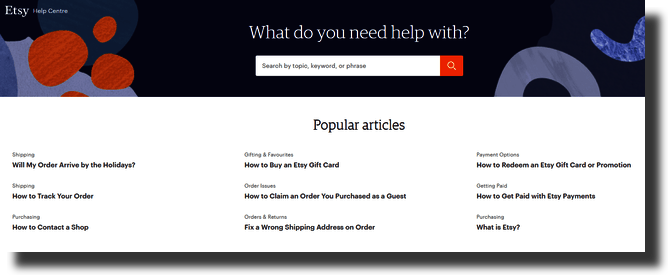
- Accessing Customer support via phone or email;
- Community forums;
- The Etsy Seller Handbook that’s continually updated;
- The Etsy Success newsletters that offer tips to advance your shop.
What Should You Consider when Doing Your Search?
So far, I have discussed some of the differences between Shopify vs. Etsy. But the question here is what should you consider before choosing a particular channel for your online store?
What makes Shopify or Etsy the preferred channels for selling your products? What are the key factors to consider when finding the right platform to sell your products online?
Below, I’ll be looking at some questions and answers to act as a guide as you look for a channel to sell your products online.
What Kind of Products Will You be Selling?
When choosing an ecommerce channel for selling your products, you should ensure that you are selling through a platform that brings in the right customer base for the products you’re selling.
In general Etsy is a niche marketplace for vintage items, craft, and handmade products. That means it’s not somewhere you’d get domestic items for instance cleaning supplies and pet food. Therefore, you might not have the success level selling on Etsy these products as you would on another platform, like Shopify.
How Much Control Do You Have Over Your Listings?
It’s important that you consider your product listing before choosing a channel for selling them. As concerns your Etsy product listings you are limited to have text and pictures.
Also, you’re given the top section for “Item Details” where you can write what you want customers to know about the item. Although this setup limits you, the given template makes it easy to follow. You simply load your listings and don’t have to do anything else.
As for Shopify, this channel gives you complete control over your product listings. Here, you can build a website with product pages as you want them to appear.
What’s more, Shopify uses a user-friendly design interface and provides you with countless templates. This helps give you multiple options to best suit your store’s personality.
When considering control over your online listings, Shopify gives you full control as it allows you to build your own website. But if this sounds overwhelming for you, you can contract a professional to handle the website development process to give you the one you want.
How Fast Are You Scaling?
The thing that makes Shopify different is that it’s easy to use, extremely intuitive, and includes all the tools necessary to operate a successful online store. Also, it’s a good channel for scaling. As your business grows, Shopify offers you higher priced plans which include more powerful tools.
Also, since Shopify is popular, it has many apps, contractors and agencies working with this channel. So, you have a network effect here.
How much Ownership do You want To Have When Choosing Your Store’s Management and Design?
If you’re looking to use your online store to drive more traffic to your different products and for a branding experience, then having full ownership of your shopping platform is the best choice.
Also, if you will not be offering hundreds of products, and you want to use a channel that the marketing is halfway done for, then consider using Etsy for your business.
Shopify gives you a level of control as concerns hosting your product. Again, it’s more a SaaS website (software as a service), than a marketplace.
This is also an important distinction worth mentioning if you want to set up a self-sufficient online store. That means that you have more control so you rely less on the platform’s holder. As such you aren’t restricted to their coding and design requirements as much.
How Much Brand Identity Do You Want To Achieve?
When comparing Shopify over Etsy, it’s important that you consider brand identity and professionalism. It’s crucial that your online store conveys more of a legitimate, trustworthy company.
This is something that Shopify can help you achieve easily. At the same time It can also be rather difficult to differentiate a brand from an Etsy listing. Since Shopify allows for more customization you can communicate your brand identity.
Also, Shopify has feature-rich offerings, therefore, not only is this platform easy to use. It also offers important metrics which are easy to access and help merchants monitor their business activities.
These features include conversion rate, average order value, top products on your online store, returning customer rate, social channels that direct the most traffic to the store, and much more.
What’s more, this platform makes it possible for merchants to see the daily overview of how the business is doing. It also makes it easy to point out where you need to focus your efforts to help maximize growth. Having your products for sale on an independent platform is equally important because this helps you have your own customers.
It also helps you grow an email list of potential and past customers. This is critical as you can use it to build a community based on your brand and it helps you nurture relationships and also boost your sales.
Channels like Etsy can be successful as a revenue stream, but it’s important that you have complete control over your brand and even be able to sell independently.
How Are You Driving Your Traffic?
This is probably the most crucial part when setting up an online store. Therefore, if you’re looking to drive your traffic to your online store, then a platform like Shopify maybe a great option for you.
Some of the possible sources of traffic are platforms like Google Ads, Facebook ads, and other PPC options. Alternatively, you can do this by simply directing organic traffic through blogging or social media.
In general, conversion rates set for Shopify stores are lower compared to Etsy listings. However, by driving customers to your Shopify online store, you’ll be growing your brand. When using Shopify, it means you own the email list and traffic, so it’s easy for you to upsell and cross-sell your customers.
When considering driving traffic to your store, Etsy as a marketplace already draws in lots of traffic. As with any marketplace, the traffic coming to your listing isn’t yours. Also, Etsy buyers aren’t loyal to any brand, but rather their loyalty is to Etsy.
In simpler terms, building a digital store on Etsy resembles building a shop on rented land. Provided you understand this, it’s possible for you to create a successful business. That said, don’t forget to branch out your channels as the business grows.
As you sell on marketplaces other factors to keep in mind besides several other competitors is your listing quality and product pricing. This is important in helping your brand name stand out.
Shopify vs Etsy: Pros and Cons
Shopify Pros
Amazing eCommerce tools: This platform offers powerful sales tools. Its inventory system helps you easily manage and expand your business. You can also track, monitor and sync stock levels and customer orders.
Highly scalable: Shopify can support all store types, from big brands to small businesses. To increase your site’s functions, consider adding apps, upgrading to access more features. Plus it lets you control your branding.
No restrictions to sell unlimited products: Lets you sell services and physical goods. By adding an app you can sell digital products. Shopify has no restrictions on the types of products merchants can sell.
Shopify Cons
Add-ons: Shopify comes with a notable app store that supports customizing and expanding your store. However, adding apps could increase your monthly costs, which can be tricky for small-scale sellers.
Exposure: Marketplaces like eBay, Etsy and Amazon have high search volumes. As for stores on Shopify, people need to know about your store for them to specifically search for it. This means your traffic will depend on your marketing, brand, and exposure.
Etsy Pros
Traffic: Since this is a marketplace, it means customers search on Etsy to find your products on this channel. This means that you won’t have to worry about promoting or marketing your brand. You can instead rely on the marketplace popularity.
Ease of use: To set up, you sign up to get an account, upload images and information of your products and start selling. That’s what makes this basic ecommerce system easy to set up a store.
Cost: Selling on Etsy does not attract an extra monthly charge when using the Standard plan. However, you need to pay transaction and listing fees, but no charges for monthly subscription except when you decide to upgrade.
Etsy Cons
Transaction fees: Etsy charges $0.20 listing fee + 5% transaction fees on items sold through Etsy. You also pay the standard 3% plus a $0.25 payment as processing fees. Such costs can overtime start impacting your sales boost to higher amounts.
Product restrictions: This channel has fixed rules around what you can sell on their marketplace. It is only for vintage items that are over 20 years, handmade goods, and craft supplies.
Creative control: Its format does not give you any freedom on branding or the layout for your product pages. Although you can include your own logo, you however can’t build a strong brand name on Etsy.
Is It Easier To Sell On Shopify Or Etsy?
Although Etsy does not give you much control over your product listings, it’s easier for you to start selling here. Again, you don’t have to be concerned with creating a website or building a product page. All you have to do is have images and descriptions of your products.
All the same you’ll need to set up your seller account. The process is very simple and can be done in a matter of minutes. Again, it doesn’t cost you until you’ve started listing and selling products.
When it comes to webstore software, the Shopify platform is also easy to create. Although it’s more expensive and harder to set up compared to Etsy. You can have the basic Shopify site created in several days.
Using Etsy with Shopify
Etsy is a great place to start if you don’t have many products to sell and you only want to start a store for free. As you might have noted from the differences and considerations above, most stores will need to consider making changes as they expand.
But the thing is you don’t have to have to choose between Shopify and Etsy. Another popular growth path for online stores can be as follows
- List several items on Etsy.
- As your sales increase, set up an eCommerce store on Shopify.
- Drive repeat customers and maintain inventory on Shopify.
- Retain Etsy to act as a marketing tool where you only list top-selling products.
- Have 3rd party applications to sync inventory and cross-list.
By taking this approach Etsy can work for you as a marketing channel that makes sales instead of a channel for driving sales to your online website.
Ultimately Shopify vs. Etsy shouldn’t be a choice to make; instead it can be a priority for you depending on the phase your online business is in.
Shopify Vs Etsy: Should You Sell On a Marketplace or Webstore
In the end, only you can make this decision, but I can provide you with helpful information to simplify your decision-making process. What counts here is getting the best channel for selling your product.
Even then, as you decide between Shopify vs. Etsy, it’s important that you take note of this distinction: Shopify is an online store builder while Etsy is more a marketplace.
Using Shopify gives you complete freedom to manage different aspects of your website and change your store’s design to suit your business needs. Plus it gives you access to Shopify’s wide variety of integrated plugins and apps.
Since your Shopify store is driven by your independent branding, it means you’re responsible for directing traffic to your store.
As concerns using Etsy, this marketplace comes with a huge, existing audience plus built-in marketing tools you can leverage. However, since it’s not an eCommerce website builder but a marketplace, you can’t customize your store or independently run your store as you’d prefer.
Due to this, Etsy might be a better option for new businesses, or stores that sell a few items and don’t yet need to set up a dedicated store.
The best part of this Shopify vs Etsy debate is that you can use both Shopify and Etsy. As you dip your toes in the eCommerce world, you could start by selling on Etsy to see how the demand is, or simply sell here if you aren’t selling a big selection of products.
Once you expand your business, you may need to open your store, get a domain, and then direct traffic to your website using Shopify.
Also consider developing your brand identity, while growing a customer base for your products. From here on you could consider using Shopify to sell while scaling your best-selling products while establishing yourself as a brand. You can also still maintain your Etsy store as an added revenue stream.



